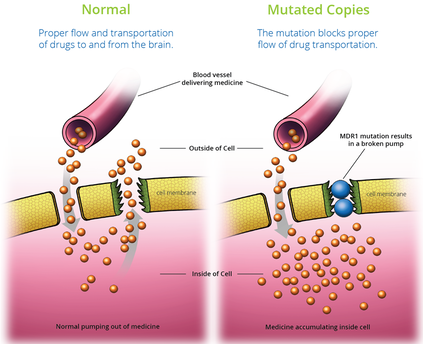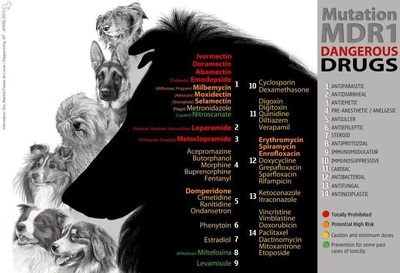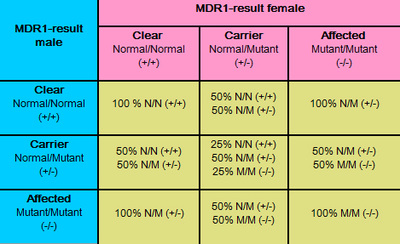Multi-drug Resistance Mutation (MDR1)
We recommend all breeding dogs and family companions be tested for Multi-drug Resistance. It will aid you and your veterinarian in choosing safe medication and doses. If you do not know your dog's MDR1 status, please treat your dog as "affected" by the mutation until proven otherwise by testing. Even if your dog is clear, it is wise to avoid problem drugs when there are other options available.
What Is Multi-drug Resistance Mutation (MDR1)
Multi-drug Resistance Mutation, commonly known as MDR1, is a genetic mutation that affects the function of a protein called P-glycoprotein. This protein plays a crucial role in transporting drugs and toxins out of cells in the body, including the blood-brain barrier. Dogs with the MDR1 mutation have a defective P-glycoprotein, which leads to reduced drug efflux from cells. As a result, certain medications that are normally safe for most dogs can build up to toxic levels in the system of MDR1-affected dogs, causing adverse reactions and potential health issues.
Breeds of Dogs That Have the MDR1 Gene
|
The MDR1 mutation is more common in some dog breeds than others. Certain breeds have a higher prevalence of this genetic mutation due to their ancestral history and breeding practices. Notable breeds that are often affected by the MDR1 gene mutation include but are not limited to:
It's essential for owners of these breeds, as well as mixed-breed dogs with a known heritage of these breeds, to be aware of the MDR1 gene mutation and its implications on medication safety. In breeds such as Australian Shepherds and Mini American Shepherds, we cannot completely eradicate the gene as it would impact our gene pool in a very negative way. As a breeder, we are very careful of how we pair our breeding dogs and avoid producing Mutant/Mutant dogs when possible. While this mutation can sound scary, it is easily manageable if you are aware and knowledgeable, unlike other diseases that you cannot control the development of. |
How Do Medications Affect Dogs With an MDR1 Mutation?
Due to the impaired function of the P-glycoprotein in dogs with the MDR1 mutation, certain drugs can't be efficiently eliminated from the body, leading to potential toxicity. Common medications that can cause adverse reactions in MDR1-affected dogs include antiparasitic agents (e.g., ivermectin, milbemycin, moxidectin), antidiarrheal drugs (e.g., loperamide), and several chemotherapy drugs.
Symptoms of drug toxicity can vary and may include neurological issues, tremors, ataxia, lethargy, and even seizures. In severe cases, drug toxicity can be life-threatening. Therefore, it's crucial for dog owners to be aware of their pet's MDR1 status and work closely with veterinarians to ensure the safe use of medications.
Symptoms of drug toxicity can vary and may include neurological issues, tremors, ataxia, lethargy, and even seizures. In severe cases, drug toxicity can be life-threatening. Therefore, it's crucial for dog owners to be aware of their pet's MDR1 status and work closely with veterinarians to ensure the safe use of medications.
Medications MDR1 Dogs Should Avoid
To keep MDR1-affected dogs safe, certain medications should be avoided altogether or used with extreme caution. Here are some common drugs that MDR1 dogs should avoid:
Ivermectin
Ivermectin is the most problematic of all the drugs that we know of. It is a common antiparasitic in Heartgard and for livestock. Please do not use Heartgard even if your dog is clear of the mutation. There are better options available.
Milbemycin and Selamectin
Milbemycin and Selamectin are also antiparasitics known to be filtered by the MDR1 protein, but they do not pose as much risk as ivermectin. For this reason, I recommend Interceptor Plus or Sentinel Spectrum for routine heartworm prevention.
Loperamide
Loperamide, also known as Immodium, is an antidiarrheal medication that WSU determined will cause toxicity at the doses used to treat diarrhea. I do not see this medication recommended often at all in general practice, but very good to be aware.
Butorphanol
Butorphanol is very commonly used as a preanesthetic drug to aid in short term pain control and sedation. It is often given with dexmedetomidine prior to routine surgery such as spays and neuters. It is recommended to reduce the dose given to mutants and carriers or just change to a different drug per your veterinarians protocols.
Acepromazine
Acepromazine is a sedative sometimes given before anesthesia or for scary events such as fireworks. However, Acepromazine is becoming less and less used. It is recommended to reduce the dose by WSU. However, my experience leads me to suggest NOT using Acepromazine at all because there are better options, one option being Trazodone (light sedation and anti-anxiety) for stressful situations or prior to anesthesia.
Apomorphine
Apomorphine is a medication used to induce vomiting soon after a dog ingests something they shouldn't have, particularly something toxic. Dose reductions are recommended by WSU.
Chemotherapy Agents
Vincristine, Vinblastine, Doxorubicin, and Paclitaxel are recommended to have doses reduced in order to avoid SEVERE toxicity.
It's essential to remember that each dog's sensitivity to medications can vary, and not all MDR1-affected dogs will react to these drugs. However, it's better to err on the side of caution and avoid potentially harmful medications whenever possible. To view a more comprehensive list of drugs to avoid, visit this article from Washington State University.
Ivermectin
Ivermectin is the most problematic of all the drugs that we know of. It is a common antiparasitic in Heartgard and for livestock. Please do not use Heartgard even if your dog is clear of the mutation. There are better options available.
Milbemycin and Selamectin
Milbemycin and Selamectin are also antiparasitics known to be filtered by the MDR1 protein, but they do not pose as much risk as ivermectin. For this reason, I recommend Interceptor Plus or Sentinel Spectrum for routine heartworm prevention.
Loperamide
Loperamide, also known as Immodium, is an antidiarrheal medication that WSU determined will cause toxicity at the doses used to treat diarrhea. I do not see this medication recommended often at all in general practice, but very good to be aware.
Butorphanol
Butorphanol is very commonly used as a preanesthetic drug to aid in short term pain control and sedation. It is often given with dexmedetomidine prior to routine surgery such as spays and neuters. It is recommended to reduce the dose given to mutants and carriers or just change to a different drug per your veterinarians protocols.
Acepromazine
Acepromazine is a sedative sometimes given before anesthesia or for scary events such as fireworks. However, Acepromazine is becoming less and less used. It is recommended to reduce the dose by WSU. However, my experience leads me to suggest NOT using Acepromazine at all because there are better options, one option being Trazodone (light sedation and anti-anxiety) for stressful situations or prior to anesthesia.
Apomorphine
Apomorphine is a medication used to induce vomiting soon after a dog ingests something they shouldn't have, particularly something toxic. Dose reductions are recommended by WSU.
Chemotherapy Agents
Vincristine, Vinblastine, Doxorubicin, and Paclitaxel are recommended to have doses reduced in order to avoid SEVERE toxicity.
It's essential to remember that each dog's sensitivity to medications can vary, and not all MDR1-affected dogs will react to these drugs. However, it's better to err on the side of caution and avoid potentially harmful medications whenever possible. To view a more comprehensive list of drugs to avoid, visit this article from Washington State University.
My Personal Experience
The MDR1 mutation is passed on as a single allele would be. The sire and dam are either Normal/Normal, Normal/Mutant, or Mutant/Mutant. While a Normal/Mutant (carrier) dog can be affected, Mutant/Mutant dogs are much more at risk. We try to avoid this situation best we can.
To put things in perspective, my first Mini American Shepherd, Sapphire, is MDR1 Normal/Mutant (carrier). Her breeder did not test any of his dogs for any genetic diseases and so I had no idea about her MDR1 status. Actually, I didn't even know about MDR1 when I bought Sapphire in 2013. Working as a vet tech, I gave her monthly Heartgard and didn't decrease butorphanol doses when performing dental cleanings. She had never shown any adverse reactions to these medications. Since testing her, I have taken better care to avoid or reduce these medications.
To put things in perspective, my first Mini American Shepherd, Sapphire, is MDR1 Normal/Mutant (carrier). Her breeder did not test any of his dogs for any genetic diseases and so I had no idea about her MDR1 status. Actually, I didn't even know about MDR1 when I bought Sapphire in 2013. Working as a vet tech, I gave her monthly Heartgard and didn't decrease butorphanol doses when performing dental cleanings. She had never shown any adverse reactions to these medications. Since testing her, I have taken better care to avoid or reduce these medications.
How Can a Dog Develop an MDR1 Mutation?
The MDR1 gene mutation is inherited, meaning it is passed down from one or both of the dog's parents. The mutation occurs in the ABCB1 gene, which codes for the P-glycoprotein mentioned earlier. Dogs with one copy of the mutated gene are known as carriers, while those with two copies (one from each parent) are considered affected.
Breeding two carriers of the MDR1 mutation can result in puppies that have the gene from both parents, putting them at risk of adverse drug reactions. Responsible breeders take genetic testing seriously and avoid breeding carrier dogs to minimize the risk of producing affected offspring.
Breeding two carriers of the MDR1 mutation can result in puppies that have the gene from both parents, putting them at risk of adverse drug reactions. Responsible breeders take genetic testing seriously and avoid breeding carrier dogs to minimize the risk of producing affected offspring.
Clinical Signs of an MDR1 Mutation
An MDR1 mutation can manifest in various clinical signs, primarily related to the dog's sensitivity to certain drugs. Not all dogs with the mutation will exhibit these symptoms, but for those that do, prompt veterinary attention is crucial. Here are some common clinical signs of an MDR1 mutation:
1. Neurological Issues: Dogs with the MDR1 mutation may experience neurological problems due to drug toxicity affecting the brain. Common neurological signs include:
2. Gastrointestinal Problems: Some dogs may develop gastrointestinal issues as a result of drug sensitivity. Signs to watch out for include:
3. Respiratory Distress: In severe cases, drug toxicity can lead to respiratory issues. Signs of respiratory distress include:
5. Mental Dullness or Confusion: Dogs may appear mentally dull or confused as a result of neurological effects caused by drug toxicity.
6. Seizures: In extreme cases of drug toxicity, dogs may experience seizures, which are episodes of uncontrolled electrical activity in the brain. Seizures can be life-threatening and require immediate veterinary attention.
It's important to note that the severity of these symptoms can vary depending on the individual dog, the drug in question, and the dose administered. Furthermore, not all drugs will cause adverse reactions in MDR1-affected dogs. However, as a responsible pet owner, it's crucial to be aware of these clinical signs and discuss any concerns with your veterinarian.
1. Neurological Issues: Dogs with the MDR1 mutation may experience neurological problems due to drug toxicity affecting the brain. Common neurological signs include:
- Ataxia: Uncoordinated movements and difficulty walking steadily.
- Tremors: Involuntary shaking or quivering of muscles.
- Weakness: Reduced muscle strength and lethargy.
2. Gastrointestinal Problems: Some dogs may develop gastrointestinal issues as a result of drug sensitivity. Signs to watch out for include:
- Vomiting: Expelling the stomach's contents through the mouth.
- Diarrhea: Loose, watery, or frequent bowel movements.
3. Respiratory Distress: In severe cases, drug toxicity can lead to respiratory issues. Signs of respiratory distress include:
- Labored breathing: Visible effort or difficulty in breathing.
- Rapid breathing: Abnormally fast breathing rate.
5. Mental Dullness or Confusion: Dogs may appear mentally dull or confused as a result of neurological effects caused by drug toxicity.
6. Seizures: In extreme cases of drug toxicity, dogs may experience seizures, which are episodes of uncontrolled electrical activity in the brain. Seizures can be life-threatening and require immediate veterinary attention.
It's important to note that the severity of these symptoms can vary depending on the individual dog, the drug in question, and the dose administered. Furthermore, not all drugs will cause adverse reactions in MDR1-affected dogs. However, as a responsible pet owner, it's crucial to be aware of these clinical signs and discuss any concerns with your veterinarian.
How To Test For an MDR1 Mutation
Testing for the MDR1 mutation is a simple and effective way to determine a dog's genetic status. Veterinary clinics and laboratories offer DNA tests that can identify whether a dog carries one, two, or no copies of the mutated gene.
The testing process usually involves a cheek swab or a blood sample from the dog. The sample is then sent to a laboratory for analysis. Results typically come back within a few weeks, and they indicate whether the dog is clear, a carrier, or affected by the MDR1 mutation.
The testing process usually involves a cheek swab or a blood sample from the dog. The sample is then sent to a laboratory for analysis. Results typically come back within a few weeks, and they indicate whether the dog is clear, a carrier, or affected by the MDR1 mutation.
Adopt a Miniature American Shepherd Puppy From Us!
We work diligently to improve our dogs every generation here at PreciousGem! Our puppies are raised with Puppy Culture activities, ENS (early neurological stimulation), and ESI (early scent introduction). They are whelped, raised, and loved in our home - NOT an outdoor kennel or barn. View our current available puppies here!
Frequently Asked Questions
How do you know if your dog has MDR1?
To determine if your dog has an MDR1 mutation, you can get a simple genetic test done. Your veterinarian can collect a cheek swab or blood sample from your dog, which is then sent to a laboratory for analysis. The results will indicate whether your dog is clear, a carrier, or affected by the MDR1 mutation.
What breeds are MDR1 deficient?
Breeds that are commonly MDR1 deficient include Australian Shepherds, Miniature American Shepherds, Border Collies, Collies (Rough and Smooth), German Shepherds, Longhaired Whippets, Old English Sheepdogs, Shetland Sheepdogs, and White Shepherds.
What are the symptoms of MDR1 mutation?
Symptoms of MDR1 mutation in dogs can include neurological issues like ataxia and tremors, gastrointestinal problems such as vomiting and diarrhea, respiratory distress, hypersalivation, mental dullness, confusion, and, in severe cases, seizures.
How much is a MDR1 test for dogs?
The cost of an MDR1 test for dogs can vary depending on the veterinary clinic and the specific testing laboratory used. On average, the test can range from $50 to $150.
When should you test for MDR1?
If you own a dog that belongs to a breed known to carry the MDR1 mutation, or if you have any suspicions about your dog's genetic background, it is best to test for MDR1 as early as possible, ideally before starting any medication. This early testing ensures you have the information needed to make informed decisions about your dog's healthcare and medication safety.
Additional Resources
|
For my full report on MDR1 while in college, click here.
|
| ||


